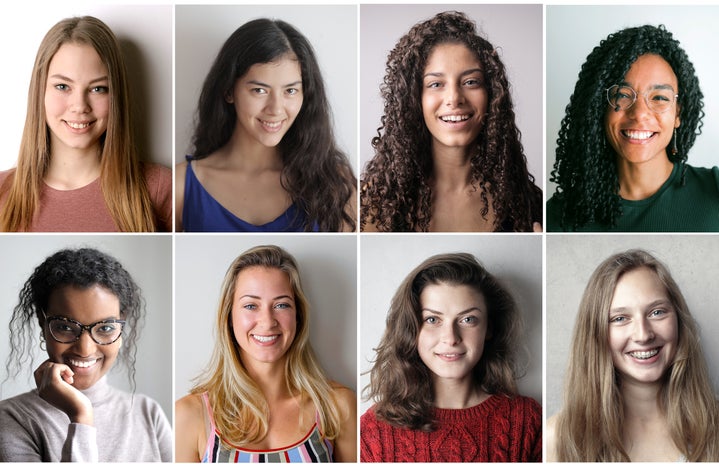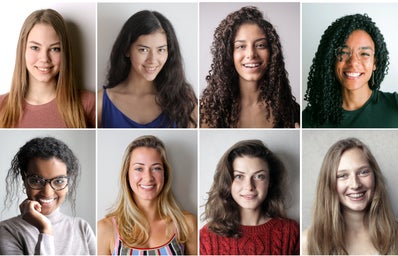A Florida high school is now receiving nationwide backlash for making digital alterations and edits to high school girls’ yearbook pictures without their permission. Bartram Trail High School in St. Johns, FL altered 80 photos in their school yearbook, and all altered photos were of female students. The digital edits were made to primarily cover up female students’ shoulders and chests because school officials deemed that they misaligned with the district’s dress code. Now, the Florida yearbook Photoshop scandal is making national headlines, and reminding many women of their own experiences with sexist dress codes.
Ben Ryan, a news reporter for Action News Jax, tweeted a side-by-side comparison of high school freshman Riley O’Keefe’s yearbook photo: one before the digital altercation, and one after that was featured in the final publication of the yearbook. O’Keefe spoke to Action News Jax about the incident, explaining that the digital altercations were not just humiliating, but also extremely sexist and demoralizing. “You’re not only affecting their photo — it’s not just for protecting them — you’re making them uncomfortable and feel like their bodies aren’t acceptable in a yearbook,” O’Keefe said.
Bartram Trail High School’s solution? The school promises to “refund the cost of yearbooks to parents who complain about the issue.” Yeah… Not really a solution at all.
“We weren’t allowed to wear leggings or show bra straps because it distracted our male teachers.”
However, this yearbook Photoshop scandal is only one incident out of thousands, if not millions, just like it. The censoring of female bodies in educational settings is an ongoing issue and is deeply rooted in sexism and misogyny. Firstly, why are women’s bodies the ones primarily being censored, and not men’s? And why are girls told that they must make male teachers “comfortable” — why is that something that young women are told to prioritize, rather than prioritizing their own comfort? Why are schools — and society in general — so focused on the policing of girls’ bodies? The focus of high school should not be on concealing girls’ bodies, but on their education. Young women and girls should be empowered in a school environment, not reprimanded and even punished for merely showing their shoulders.
To convey the deeper societal issue of this one incident, I asked several college women to share their own experiences and issues with sexist high school dress codes. Although I only spoke with five college women, several more came forward with their stories. The amount of women who wanted to share their negative experiences with high school dress codes just reveals how widespread and damaging this issue has become for young women across the country.
“The year after I graduated from my high school, they banned girls from wearing uniform skirts and required that girls wear pants instead. This became a huge issue because of the reasons they chose to ban the skirts in the first place: too many detentions were being given (which was not actually the case) and the male teachers were supposedly ‘uncomfortable’ addressing skirt length. Protests were held and petitions were signed, but nothing was done to reverse the ban or find a better solution for female students. I know this didn’t affect me directly, but it did sadden me to know that nothing has been done to solve the problem (still!) and that the school is just ignoring the wishes of its female student population and making them all feel as if they’ve done something wrong.” — Rylie Walsh, 21.
“My math teacher sophomore year of high school made an incredibly rude and objectifying comment about one of my classmate’s cleavage.”
“At my all-girls high school, we weren’t allowed to wear leggings or show bra straps because it distracted our male teachers. [The] administration expected all teachers to enforce our uniform[s] and check skirt lengths and the male teachers said it was inappropriate and wouldn’t do it.” — Clara Houk, 21.
“When I was in high school, during my sophomore year, they started cracking down on the dress code. We wore uniforms everyday that included a white blazer and a plaid blue skirt. Coming from an all-girls school, almost everyone was required to wear this dress code. Your skirt had to be arms length on your legs. This idea that your skirt had [to] be finger length to your thigh did not give a universal length to anyone. Many people would get UVs (Uniform Violations). We were told that our skirts could not be short because it made our three male teachers uncomfortable.” — Lilly Higgins, 20.
“My math teacher sophomore year of high school made an incredibly rude and objectifying comment about one of my classmate’s cleavage. It was a young female teacher who had always seemed kind, so the comment was extremely disturbing and shocking. My school did not have extremely strict dress codes, and in my opinion that incident was absurd. The girl did not get penalized or have to change clothes, but the fact that a teacher thought it was appropriate or warranted to comment on the body of a 15-year-old student is extremely disturbing. I think that the policing of girls’ bodies, especially the bodies of minors, is incredibly misogynistic and frankly disgusting. The idea that girls have to cover themselves in learning environments to keep from distracting boys unnecessarily sexualizes girls. It perpetuates rape culture by conditioning young girls to believe that their bodies are not their own, and are something to be displayed for others.” — Sophie Villamor, 21.
“Dress codes perpetuate rape culture by conditioning young girls to believe that their bodies are not their own, and are something to be displayed for others.”
“I attended a private, Christian, college-prep boarding school in Honolulu, Hawai’i from seventh to 12th grade. The dress code was something that every girl struggled with. Boys were made to dress professionally while girls were told to cover up. I constantly felt subjected to the clothing that I wore and was often more worried about whether or not I was dressed ‘appropriately’ rather than my schoolwork. Instead of learning to dress professionally, I was taught to cover myself up for the benefit of others. Now being in college where there isn’t a dress code, I’m able to dress comfortably the way I want to, and therefore, I feel way more confident in class. Clothing is a freedom of expression, and no one should dress for the benefit of others. Wear what you want and wear it confidently!” — Nikki Wong, 20.
Like Nikki said, young women and girls should wear what they want and wear it confidently, but the harsh reality is that sexist high school dress codes prohibit young women all across the country from doing so. Incidents like the one in Florida simply show that although society may be telling young girls to act more confident, they are not practicing what they preach by implementing misogynistic dress codes and policing girls’ bodies. Sexist high school dress codes cut much deeper than just being about clothes; the repercussions they have on a woman’s confidence is harmful and degrading for years to come. We need to speak up on these types of injustices and advocate for young girls’ and women’s empowerment and freedom — because unfortunately, things aren’t going to change unless we speak up.


